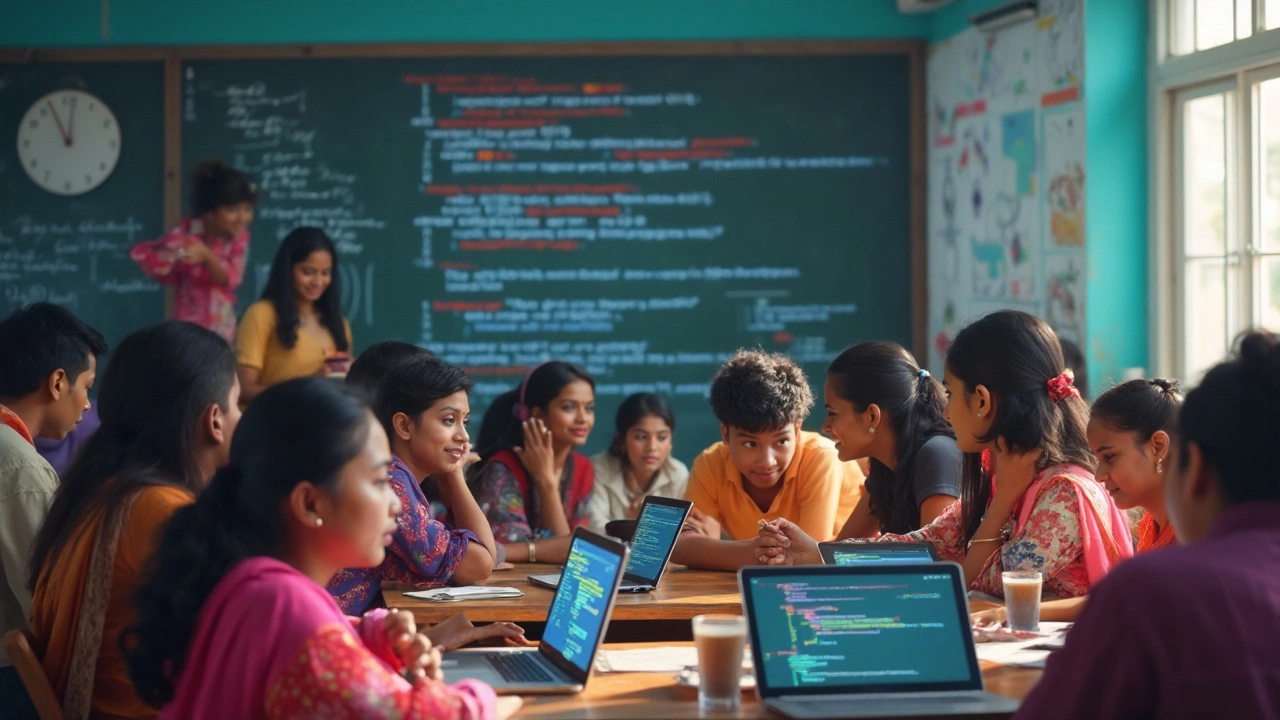The digital age has opened doors for many aspiring programmers to learn coding outside traditional classrooms. Self-taught coders are becoming more prominent in the tech industry, with numerous success stories proving the viability of this path. It begs an intriguing question: Can someone truly teach themselves coding? The answer lies in one's dedication, resourcefulness, and ability to navigate the vast sea of online and offline resources.
From YouTube tutorials and coding communities to open-source projects and coding boot camps, the tools are plentiful and varied. The key is knowing where to start and how to leverage these resources effectively. But it's not just about understanding syntax and frameworks; successful self-taught coders often develop a suite of skills that complement their coding abilities, such as problem-solving, time management, and networking.
With determination and the right approach, the journey to becoming a competent coder can be empowering and rewarding. So, let's dive into the world of self-taught programmers and explore what it takes to thrive in this ever-evolving field.
- The Rise of Self-Taught Coders
- Essential Resources for Learning
- Skills Beyond Coding
- Practical Tips for Aspiring Coders
The Rise of Self-Taught Coders
The concept of the self-taught coder has seen a remarkable surge over the last decade. Part of this growth can be attributed to the tech industry’s ever-increasing demand for skilled programmers coupled with the accessibility of digital learning tools. Unlike the rigid academic paths of yesteryears, today's aspiring coder can simply open a laptop and dive into the vast ocean of coding resources offered online. This democratization of education has allowed individuals who, due to time, financial, or geographic constraints, would have been otherwise hindered from entering this booming industry.
Tech giants like Google and Apple have informally acknowledged the value of self-taught developers. They've emphasized skills over formal education, with job postings often listing degrees as "preferred" rather than "required." This cultural shift has opened the door for a diverse range of talents, embodying the idea that knowledge and skill do not necessarily align with traditional qualifications. According to a Stack Overflow Developer Survey, nearly 70% of professional developers state they consider themselves partly if not completely self-taught. This statistic highlights the shift in how programming skills are acquired and valued.
An interesting illustration of this trend is the creation and growth of online coding platforms and communities. Websites like Codecademy, FreeCodeCamp, and Khan Academy offer free courses on various programming languages, suitable for beginners to advanced learners. They provide structured learning paths adorned with interactive projects that simulate real-world scenarios. These platforms often incorporate community features allowing learners to collaborate, share solutions, and grow together. It's this sense of community and shared struggle that adds a layer of motivation for many.
"Programming can be learned by anyone, not just in institutions. The resources available today allow self-motivated individuals to master coding skills that meet industry standards." - John Resig, Creator of jQueryProgramming has transformed into a self-directed discipline, where the learner's curiosity and dedication often play a more significant role than institutional endorsement. The paths someone might take on this journey are varied. Some might start by tackling a personal project or solving specific problems, while others may choose a more structured approach, progressing through an online course's guided curriculum.
Moreover, the tools supporting this movement toward self-education continue to innovate. Platforms now encompass aspects of game-based learning, social networking, and even AI-driven personalized teaching. For instance, AI can now customize learning experiences to match the evolving needs of individual learners, suggesting next steps and providing instant feedback. Such technology facilitates a more interactive and tailored learning process, which is often crafted to keep the learner engaged and motivated throughout their journey.
Acknowledging these developments in self-guided learning raises intriguing questions about the nature of skill acquisition itself. It positions learners to reflect not only on what they're learning but how they're learning. As learn to code has become a mantra for the digital age, the rise of self-taught coders suggests a bigger story about democratic access to education and the reshaping of traditional career paths. The truly exciting part is that this is just the beginning, and with continuous advancements in technology, the journey of self-learning is bound to evolve even further.

Essential Resources for Learning
When starting the journey to become a self-taught coder, having a roadmap to guide your educational endeavors is crucial. There is a wealth of resources available, with each offering unique benefits and challenges. Online platforms like Codecademy, Coursera, and edX provide structured learning paths, spanning from introductory courses to advanced topics. These platforms present an interactive approach, allowing learners to engage directly with code, execute tasks, and practice problem-solving skills effectively. They cater to different learning paces, fitting into the schedules of busy individuals.
In addition to online courses, vast platforms like GitHub function as both learning hubs and collaborative environments. New coders can delve into open-source projects, getting hands-on experience with real-world applications and interacting with experienced professionals. Joining coding communities such as Stack Overflow or Reddit's programming forums offers immense value too. Here, learners can ask questions, share knowledge, and garner feedback on their progress. The importance of community cannot be overstated; it revives motivation and provides a sense of belonging amidst the often isolated world of coding education.
Books and Tutorials
Books remain an invaluable resource for those who prefer a more traditional learning format. Titles like 'Automate the Boring Stuff with Python' by Al Sweigart or 'Eloquent JavaScript' by Marijn Haverbeke provide a deep and thorough analysis of specific languages. These books blend theory with practical exercises, encouraging deeper comprehension. Accompanying video tutorials on platforms such as YouTube can offer additional clarity and visual context to complex topics, often necessary for visual learners. It's remarkable how many professionals attribute their beginnings to self-study through such mediums.
"Learning to write programs stretches your mind, and helps you think better, creates a way of thinking about things that I think is helpful in all domains." - Bill Gates
Moreover, practice is the cornerstone of coding mastery. Websites like LeetCode, CodeSignal, and HackerRank present coders with challenges that range in difficulty, encouraging gradual proficiency development. These exercises not only improve programming skills but are also widely used to prepare for technical interviews. Engaging consistently with these platforms builds confidence in problem-solving and coding under scenarios that mirror industry standards.
Local Meetups and Workshops
While much of self-learning occurs at home, attending local meetups and workshops can add another dimension. Cities worldwide host tech gatherings, often featuring talks by industry leaders and opportunities to network with peers who share similar aspirations. Websites like Meetup.com frequently list such events, and participating facilitates real-world communication skills, which are often overlooked but critical for any career, especially in tech. During these meetups, coders can also receive firsthand advice from those who navigated the self-taught path successfully.
If the goal is to enter the tech workforce swiftly, coding boot camps offer intensive, immersive learning environments. Programs like General Assembly and Flatiron School promise expertly curated curricula, tailored to industry needs. These boot camps simulate real-world working conditions over several weeks or months, teaching not just individual programming languages, but full-stack development tools and soft skills like collaboration and project management. Prioritize gathering information from alumni and reviews, as experiences can significantly differ based on personal goals and preferred learning styles.

Skills Beyond Coding
When diving into the world of programming, many aspiring self-taught coders find that the journey involves more than understanding languages and writing code. The most successful individuals cultivate a variety of skills that extend beyond mere syntax or algorithmic thinking. At the core of these skills is problem-solving—a trait often synonymous with programming itself. Yet, mastering this skill requires learning how to break complex problems down into manageable parts, identifying patterns, and implementing strategic solutions. Visionary coders often say that coding is less about typing and more about the cognitive gymnastics behind it, a sentiment echoed by many esteemed developers.
Effective communication is another invaluable skill often underestimated by coders. As they progress in their learning, the ability to articulate their thoughts and share their ideas with peers becomes paramount. Whether it's writing comprehensive documentation, explaining concepts during a team meeting, or discussing project needs with non-technical stakeholders, communication shapes collaborations and impacts project success. A quote from the late Steve Jobs rings true:
“The people who are crazy enough to think they can change the world are the ones who do.”This highlights the transformative power of articulating innovative ideas.
Teamwork and adaptability are no less important on the path to becoming a self-taught coder. Modern software development projects involve working closely with teams, often requiring constant adaptation to changing requirements, technologies, or project goals. Coders must learn to navigate different personalities and work styles to integrate effectively into teams. Adaptability also comes into play when learning new languages and frameworks—domains that demand willingness to unlearn outdated methods while embracing novel solutions rapidly because the tech landscape never stands still.
Time Management and Self-Motivation
Another crucial aspect is time management, especially for those juggling multiple commitments alongside their programming endeavors. Crafting a balanced learning schedule that includes breaks and regular practice is vital. Self-motivation ties in closely here, acting as the fuel that propels learners to stay committed even when faced with challenging obstacles like debugging an error-laden code. Self-taught coders often swear by curated playlists, long strolls, or short meditations that help them recalibrate their mental energy, ushering in new brainwaves tailor-made for creativity.Networking can also pave the path to mastery in ways none other can. In the tech industry, who you know can be just as vital as what you know. Aspiring coders should strive to connect with peers and experienced professionals through online forums, coding meetups, and social media groups. Such interactions provide invaluable learning experiences, mentorship opportunities, and can even lead to job openings. By building a strong professional network, self-taught coders can stay updated on the current trends, gain insights from industry veterans, and grow their confidence by sharing experiences with like-minded individuals.
Interestingly, a survey conducted by Stack Overflow in 2023 illuminates this practice in numbers. Among self-taught developers surveyed, 78% reported engaging in regular online coding communities, with 63% attributing their employment success directly to networking efforts. This data underscores the value of community engagement in the modern coding landscape, making it an indispensable part of a coder's journey.

Practical Tips for Aspiring Coders
Embarking on the journey to become a self-taught coder is both exciting and challenging. Whether you're diving into web development, exploring data analysis, or tinkering with software applications, the key to success lies in your strategy and persistence. As you navigate through this learning process, it's critical to approach it with both structure and flexibility. Here are some invaluable tips that can make your coding adventure less daunting and more rewarding.
Set Clear Goals and Break Them Down
One of the first steps to thriving as a self-taught coder is to define clear, achievable goals. Determine what you want to accomplish—be it mastering JavaScript, building a personal project, or understanding data structures and algorithms. Once you've set your primary objective, break it down into smaller, manageable tasks. This could involve daily coding exercises, weekly challenges, or monthly projects. This approach not only prevents you from feeling overwhelmed but also allows you to track your progress and celebrate small victories along the way. As Steve Jobs famously said,
"The only way to do great work is to love what you do. Keep pushing forward even when things get tough."
Utilize Diverse Learning Resources
In today’s world, a treasure trove of learning materials is available at your fingertips. Make use of online platforms like Codecademy, freeCodeCamp, and Udemy that offer structured courses in various languages and topics. Dive into YouTube channels dedicated to programming, such as The Net Ninja or Traversy Media, which can provide insights through engaging tutorials. Books also remain a valuable resource; consider titles like "Eloquent JavaScript" or "Python Crash Course" as part of your learning toolkit. Keeping a diverse set of resources can expose you to different teaching styles and perspectives that enrich your learning experience. Don’t shy away from checking out coding forums and communities—Stack Overflow and GitHub discussions are excellent places to ask questions, find solutions, and connect with fellow learners.
Practice Problem-Solving Regularly
While understanding theory is important, honing your problem-solving skills can truly set you apart in the field of programming. Websites like LeetCode, HackerRank, and CodeWars provide endless opportunities to practice solving coding problems at varying difficulty levels. Tackling these regularly not only sharpens your logical thinking but also builds a habit of approaching problems methodically. As you practice, try to write clean, efficient code with well-documented steps—this will foster good habits that have immense value in real-world projects. A coder's proficiency is often measured by their problem-solving capabilities; hence, investing time in this area is crucial.
Stay Consistent and Patient
Consistency is key in the self-learning journey, and patience is your steadfast companion. Allocating a regular time slot each day for coding, even if it’s just 30 minutes, helps solidify your knowledge through repetition. Training your mind to think like a programmer takes time, and progress may often feel slow. But remember that programming is a marathon, not a sprint. As you continue to learn and build projects, your improvement will become apparent, motivating you to keep moving forward. It's important to embrace mistakes and learn from them. After all, each error is just another opportunity to grasp concepts more thoroughly.
Join a Supportive Community
As you venture into coding, you don’t have to do it alone. Join coding communities or societies online, where you can find like-minded individuals on similar journeys. Engaging with these groups will give you access to peer support, collaboration opportunities, and potential mentorship. Platforms like Reddit’s r/learnprogramming or Discord’s coding communities are excellent places to start. Participating in conversations, sharing your projects, and seeking feedback can offer different perspectives and push you to think creatively. A supportive network encourages growth and makes the journey not just bearable, but enjoyable.



